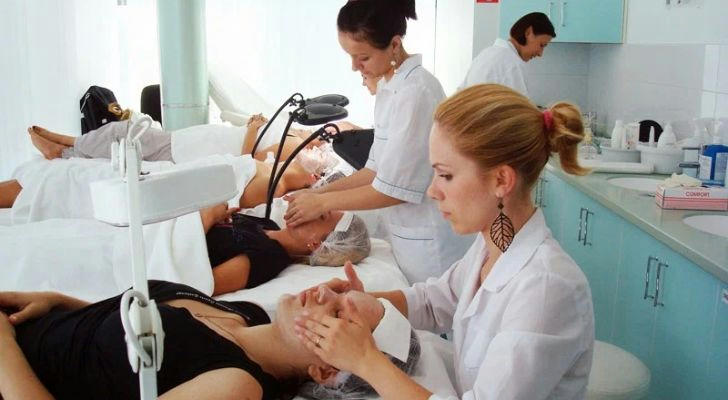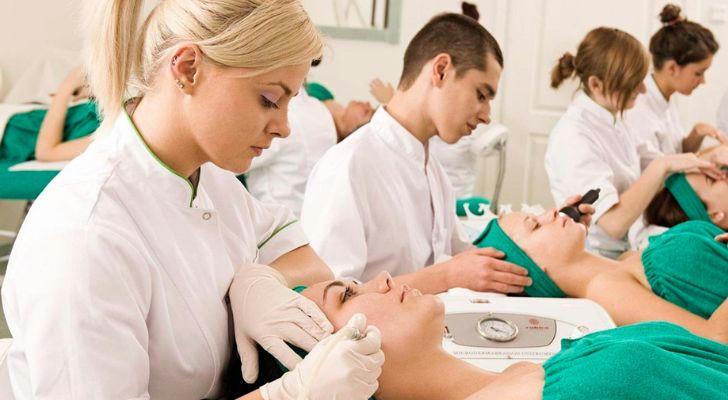Unlock Your Beauty Career: Master In-Demand Skills with Accredited Cosmetology Training
The beauty industry in the United States is a vibrant, ever-evolving landscape where creativity meets science. From cutting-edge skincare innovations to bold makeup trends, professionals in this field are in high demand. For those passionate about transforming lives through beauty, enrolling in a comprehensive cosmetology program and earning certification is the first step toward a thriving career. This guide explores how accredited training programs equip aspiring professionals with the expertise, credibility, and confidence to excel in this competitive industry.

Why Cosmetology Training Is Your Ticket to Success
The U.S. beauty sector is booming, with the market projected to exceed $100 billion by 2026. This growth isn’t just driven by consumer demand for luxury services—it’s fueled by a societal shift toward wellness and self-expression. Skilled cosmetologists are no longer seen as mere service providers but as trusted advisors who enhance clients’ confidence and well-being.
However, breaking into this field requires more than raw talent. Employers and clients prioritize professionals with formal education, as it ensures adherence to safety protocols, technical precision, and ethical practices. Accredited programs, such as the Fundamentals of Cosmetology course, provide a structured pathway to mastering these competencies while aligning with state licensing requirements.
What to Expect from a Top-Tier Cosmetology Program
Quality cosmetology courses blend theory, hands-on practice, and industry insights. Here’s a breakdown of essential modules that prepare students for real-world challenges:
1. Hair Design and Chemistry
Modern hairstyling goes beyond cuts and colors. Students learn about hair structure, chemical interactions (e.g., keratin treatments, balayage techniques), and scalp health. Advanced courses may cover extensions, textured hair care, and sustainable product alternatives.
2. Skincare Science
With the rise of “skinimalism” and personalized routines, esthetics training is critical. Courses teach skin analysis, treatment of conditions like hyperpigmentation or rosacea, and techniques such as dermaplaning or LED therapy. Knowledge of ingredient efficacy and hypoallergenic formulations is also emphasized.
3. Nail Artistry and Safety
The nail care industry has exploded, with clients seeking everything from minimalist designs to intricate 3D art. Training includes sanitation protocols, gel and acrylic application, and nail health diagnostics. Programs often highlight the importance of ergonomics to prevent workplace injuries.
4. Makeup for Diverse Needs
From red-carpet glam to gender-neutral looks, makeup artistry requires versatility. Students explore color theory, contouring for different face shapes, and techniques for sensitive skin. Courses may also address cultural competency to serve clients from varied backgrounds.
5. Business Acumen and Ethics
Running a successful beauty business demands more than technical skill. Modules cover client retention strategies, social media marketing, and financial planning. Ethical topics, such as inclusivity in service offerings and eco-friendly practices, are increasingly integrated into curricula.
Programs like the Fundamentals of Cosmetology often use interactive tools—video demonstrations, quizzes, and virtual client simulations—to reinforce learning. Such resources ensure students graduate ready to tackle salon floors or entrepreneurial ventures.

The Power of Certification in Building Trust
Certification isn’t just a credential—it’s a career accelerator. Here’s why it matters:
Licensing Requirements: All 50 states require cosmetologists to pass written and practical exams to obtain a license. Accredited programs prepare students for these tests, covering state-specific health codes and procedural standards.
Higher Earning Potential: Licensed professionals earn 19% more on average than uncertified workers, according to industry surveys. Specialized certifications (e.g., bridal makeup or medical esthetics) can further boost income.
Client Loyalty: In an era of online reviews, certification reassures clients of your expertise. A 2023 survey found that 72% of clients prefer salons with licensed staff, associating certification with hygiene and professionalism.
How to Choose the Best Program for Your Goals
With countless options available, aspiring cosmetologists should consider these factors:
Accreditation Status
Verify that the program is approved by your state’s licensing board or recognized bodies like the American Association of Cosmetology Schools (AACS). Accreditation ensures the curriculum meets industry standards.
Flexible Learning Formats
Online courses with self-paced modules, live webinars, and downloadable resources are ideal for those juggling work or family commitments. Look for programs offering lifetime access to materials for ongoing reference.
Hands-On Opportunities
Even in online programs, practical experience is vital. Some courses partner with local salons for internships or provide kits for at-home practice. Virtual reality (VR) tools are also emerging to simulate client interactions.
Career Support Services
Top programs offer job placement assistance, resume workshops, and networking opportunities with industry leaders. These resources are invaluable for landing roles at luxury spas, film studios, or high-end salons.

From Classroom to Career: Pathways in Cosmetology
Certification opens doors to diverse opportunities:
Specialized Roles: Become a lash extension artist, men’s grooming expert, or clinical esthetician in dermatology clinics.
Entrepreneurship: Launch a mobile beauty service, organic skincare line, or YouTube channel teaching DIY techniques.
Global Opportunities: Cruise ships, fashion weeks, and international resorts often seek certified professionals for seasonal or full-time roles.
Continuing education is key to staying relevant. Emerging trends like AI-powered skin diagnostics, clean beauty standards, and non-invasive treatments (e.g., microcurrent facials) require ongoing learning. Many professionals pursue advanced certifications every 2–3 years to maintain their edge.
Final Thoughts: Elevate Your Passion into a Profession
The beauty industry rewards those who combine skill with dedication. By enrolling in an accredited cosmetology program, you’re not just learning techniques—you’re investing in a career that empowers others to look and feel their best. Whether you dream of owning a boutique salon, collaborating with fashion influencers, or pioneering sustainable beauty solutions, the journey starts with quality education.
As trends evolve and consumer expectations rise, certified professionals will remain at the forefront of this dynamic field. Ready to take the first step? Explore programs that align with your aspirations, and prepare to turn your passion into a legacy.
